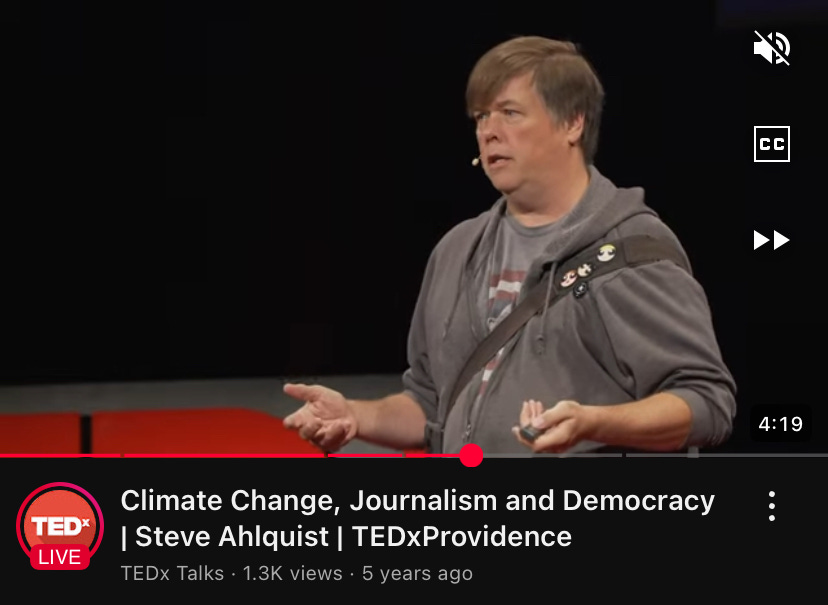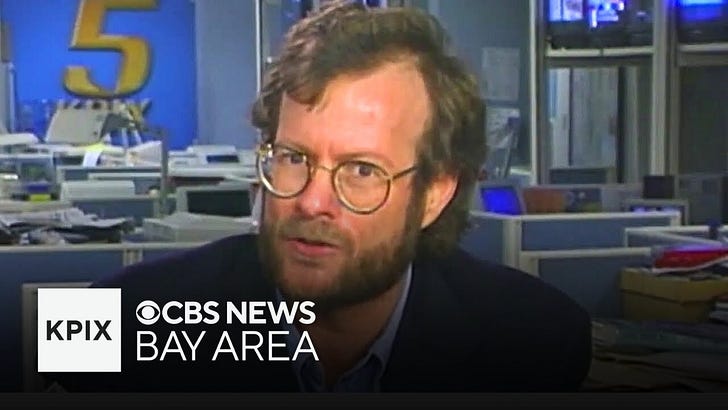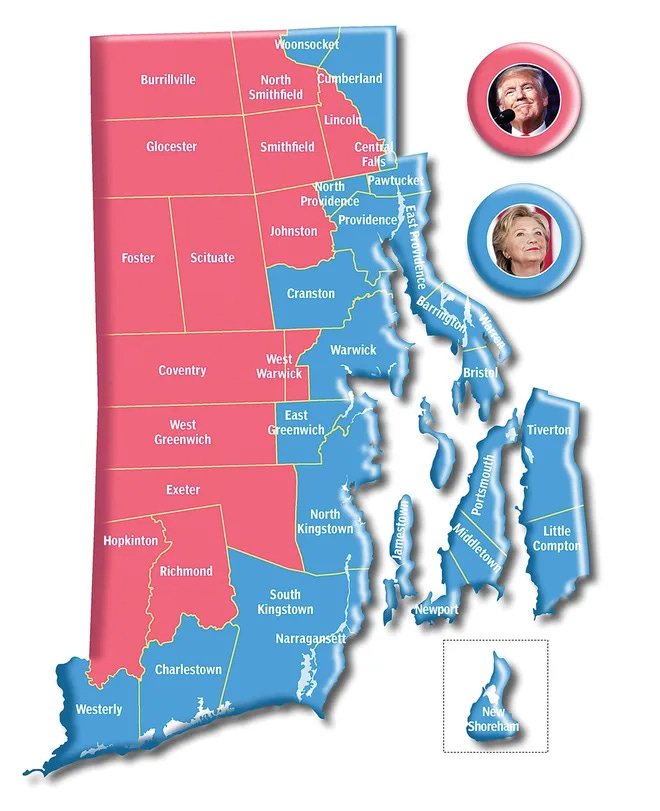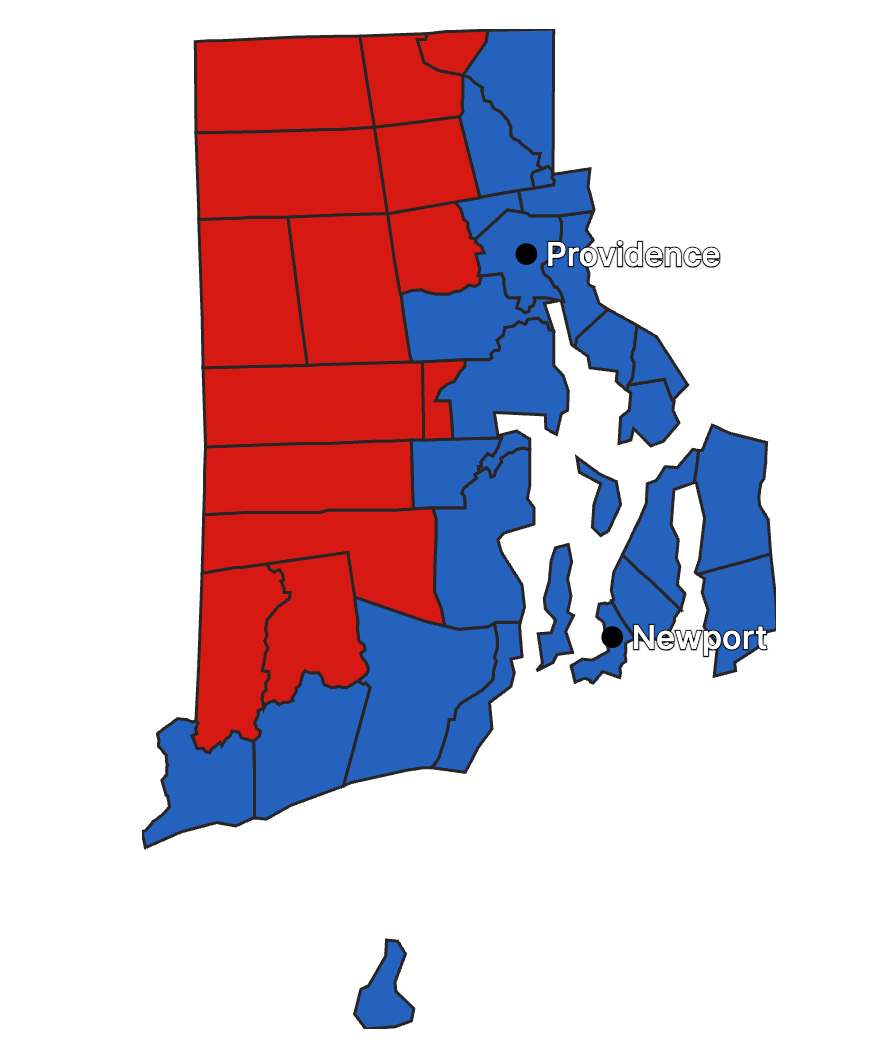Steve Ahlquist’s Selective Hearing
Spiked investigative columns, erased queer histories, and other malfeasances abound…
Steve Ahlquist, renowned throughout Southern New England as a prolific journalist and proselyte of Secular Humanism, has published false columns about Providence Public Schools and its termination of queer teachers, including myself. It is a symptom of his larger brand of queer Respectability Politics, a straight white man’s liberal scolding and tone-policing that refuses to grapple honestly with the complexities of queer life.
He and I have stopped speaking, probably permanently, because I was not going to politely play games when he misrepresented matters of fact and record involving my workplace and its safety for me as a trans woman, not to mention issues of discrimination that are the topic of an ongoing labor grievance filed by my union. He has participated in the obfuscation of wrongdoing in the workplace against me via methods going far beyond simply not letting me be in a group pic on his Substack.
He intentionally erased me from history because he doesn’t like me. He arbitrarily just said “I don’t see the story of non-cis faculty terminations in Providence as relevant to you,” even though I am the trans differently-abled woman faculty member who has worked ten years and only accrued $11,000 in assets! I am the senior-most non-cis faculty member in terms of years worked, at least as far as I know, and my termination is completely meaningless to Steve Ahlquist.
The particular matter at hand is one of confidentiality under the auspices of the PPSD Collective Bargaining Agreement, meaning Steve has no manner of validating what he claims in his headlines.
In fact, the circumstances surrounding the nonrenewal of multiple queer teachers on Valentine’s Day 2025, including myself, is tied to an (extremely private) ongoing matter of closed arbitration with both the Providence Teachers Union and the District Human Resources Department regarding noncompliance with various civil rights provisions in the workplace. This confidentiality is in place to protect both adult Faculty and youth Students as so prescribed by a multitude of laws, federal, state, and municipal, that designate the case as Confidential. It would be Invasion of Privacy for publication of that personal information to occur.
This complaint fundamentally undermines multiple claims made by Steve Ahlquist’s reportage from these past several months in a manner I would argue merits either Retraction or a sizable Correct the Record appendix to his original columns.
In practical terms, that would mean any local journalist can simply contact the aforementioned parties, PTU and PPSD, and ask them for Press Comment on the matter. Certain legal obligations will preclude disclosing any vital information or details about faculty members, undeniably, but it likewise is easy to put the pieces together. (Not for nothing did I CC Pat Crowley on everything just because I could…)
But ironically, the civil rights protections granting closed arbitration to all labor grievances demonstrates that Steve is basically writing conjecture and spoon-fed narrative from a sensationalist. He left out such an immense amount of detail and nuance that could fundamentally redefine a reader’s opinion on the topic.
This is to say, in no uncertain terms, that Ahlquist’s coverage is flat mistaken, flawed journalism.
Is This Warranted?
Everyone complains that he is on “our side” and that this is shooting fish in a barrel. I don’t necessarily agree as a queer journalist who has actually worked with him. Regrettably, there is a great distinction between a personal friendship and a professional obligation to the record’s veracity. Ahlquist simply cannot accept this because of the obvious ego blow involved. No Ally likes being told they screwed up, especially this badly.
Yet simultaneously, it must be emphasized that Ahlquist relies upon homophobia as a genesis of revenue. He is not a gay reporter, only a straight columnist writing for pay about gay topics aligned with his larger political agenda. I am queer and the basic premise of standpoint epistemology articulates a coherent argument about Ahlquist’s shortcomings.
Steve Ahlquist is a cis white heterosexual journalist who unilaterally, without any traditional press training or editorial checks-and-balances, has been laying out the parameters, boundaries, and margins of acceptable queer politics and press representation of it for over a decade. While other queer publications are still in existence, none have as substantial a reach into the non-cis non-gay community. His queer-focused columns have the largest readership in the state by a wide margin.
That is not a position that a white cis heterosexual male should unilaterally control. He is a selective microphone for distinctively Northern liberal Democrats when it comes to queer politics and his grasp of queer issues is limited in a fashion imposing a censorious Respectability ethos.
Healthy Queer Press Debate
Part of a healthy queer press is an ethical and robust debate about how we understand the role and obligations of our self-professed Allies that stand to make a buck from such affirmative actions.
What do I mean? Let me use the example of Harvey Milk.
Prior to the AIDS epidemic, the gains made by the LGBT+ civil rights movement were broadly-defined as cross-class alliances between the liberal element of the business community, progressive unions, and sympathetic Democrats. The San Francisco unions endorsed the insurgent candidacy of Harvey Milk, that city’s first LGBT elected public official, because Milk had accomplished the otherwise-impossible, getting anti-union Coors Brewing products out of the gay bars, a longtime stalking horse for the Teamsters.
As a small business owner running a photo hut in the Castro District, Milk saw himself as a New Deal Democrat in line with Adlai Stevenson (the last “big-government liberal” nominated for president prior to John Kennedy’s election as an anti-New Dealer). He was building a broad political coalition that would have allowed plenty of space for small business owners (and even a few big business executives) that were willing to subscribe to a humanitarian campaign around gay rights.
Milk himself was a political chameleon whose canonization has all-too-easily obscured that, as a Navy veteran, he had been a button-up New York Republican Party supporter of Barry Goldwater prior to coming out of the closet.
Let that sink in: Until Harvey Milk realized he was a minority, he was a conservative supporter of a presidential candidacy predicated solely on white grievances about Brown v Board, the Civil Rights Act, and Voting Rights Act. His survivors have not been retiscent about his shortcomings with racism, women’s issues, and other considerations (Cleve Jones, a Milk protégé, even asked aloud if Milk would have been one of the first to contract HIV given his proclivities).
There are two examples of Milk’s biography to consider, and both were a tad over-sympathetic to the martyred City Supervisor.
The first is a 1982 prose biography, The Mayor of Castro Street by the late Randy Shilts. The biographer had been one of the few openly gay journalists in the newsroom of the San Francisco Chronicle and it gave him a unique edge as the first reporter to cover an LGBT beat. Shilts had gone to the bars, the bath houses, the discos, the parades, and the rallies spanning 1972-1978, the span of Milk’s entire political career. He understood what it meant to patronize those establishments in ways his colleagues refused to on principle, meaning he had the best kind of access.
The book has its own shortcomings, not unlike those I detailed in my earlier ‘Reading Randy’ column last year. But it also had an anthropological/sociological lens for understanding not just a personality but an entire subculture that was predicated upon stigma, ostracism, and marginalization of its basic self-expression. Through the character-personage of Harvey Milk, we journey through the gay underground of New York and San Francisco in the three decades following World War II, going to places like the upstairs of the Old Met in New York for adolescent trysts and City Hall’s boiler room for political machinations.
The second is the Sean Penn biopic Milk (dir. Gus Van Sant, 2008), which superimposed liberal grievances about the Bush administration and marriage equality onto a historical drama where such considerations were not presented in such a manner and sense. The 1970s San Francisco gay community had a far different understanding of its political agenda. Elimination of sexual hierarchies included a serious skepticism about monogamy and longterm relationships during the pre-AIDS era, a combination of Sixties-styled hippie ethos alongside much older Victorian/Gilded Age notions about free love (how many people today recall that all-too-brief moment of feminist/queer republishing old anarchist pamphlets by Emma Goldman, Margaret Sanger, and Oscar Wilde?) Marriage equality was a minority opinion because it was perceived as a form of assimilation as opposed to sexual liberation. Gay men of the era embraced libertine polyamory as a revolutionary mode of social expression and so monogamy was a kind of sexual Luddism.
This film makes no indication of Milk’s conservatism, racism, or dubious intimacy ethics. Also, Diego Luna’s character is a cringe-inducing anti-Latino stereotype obscuring a truly complex bio-ethical debate about Milk engaging with Jack Lira, a psychologically-disturbed and constantly-intoxicated boyfriend who was grudgingly abused, disregarded as a nuisance and embarrassment by Milk’s office staffers until he died of suicide.
The case of Harvey Milk, just as with Brett Smiley, David Cicilline, or any other queer Democrat, shows that liberalism will win the day over the humanitarian concerns of the most vulnerable.
That example alone should demonstrate a significant point about what all Rhode Islanders should expect of any queer politics and politicians who are worth their salt. Steve Ahlquist fails to hold his favored politicians to that level of scrutiny and generate a dynamic analysis of queer topics.

Ahlquist, like an ostrich, simply didn’t want to know.
Steve’s unfortunate problem is that he misunderstood the true definition of unconditional support for trans teachers. He compromised that in service of an agenda.
The narrative that Steve was presented with failed to compute with his larger political agenda, which extends much further than simplistic niceties about ‘Secular Humanism’ and into the realm of being told to play nice with a clique of College Hill Gentrification Democrats whose 20-year streak of tone-deaf messaging has relegated them to a ghetto of Starbucks bulletin boards.
For Steve Ahlquist, the non-cis folx of Rhode Island should either agree with his rather short-sighted and exclusionary perspective or take a hike.
And we all know this is undeniable because of the fact that Steve’s entire selling point, his modus operandi, is that he is the machine unilaterally pumping out news copy left and right. He left RIFuture, then he left UpriseRI, and now he again is doing the one-man-band routine on Substack. The guy obviously prefers a unilateral narrative perspective, meaning not having colleagues report on stories in ways that contradict him.
It frankly is understandable.
First he was the muckraker uplifting voices.
But then those voices were elected to office, transforming the power paradigm into privileged access to politicians in exchange for favorable verbiage.
And I Say This From Personal Experience
Nine years ago, when both of us were writing for Bob Plain’s RIFuture blog, the Rhode Island Retired Teachers Association read my columns on ’s forensic audits of the RI State Pension Fund, which I argued should be subjected to scrutiny under RICO laws. This ramshackle lobby of seniors was impressed by how I had seen through Gina Raimondo’s pension heist and hired me to do Sponsored Content with them, a killer ad deal that included juicy gossip about the AFL CIO hawking slipshod retirement products to pensioners…until RIRTA’s Diane Bucci mentioned her desire to grill Treasurer Seth Magaziner hard. Rather than risk losing access, RIFuture gave me the boot, spiked the ad deal, and left decent questions unanswered.
Paradoxical
Steve literally erased me from mainstream news media coverage of my own queer purging because he, as a white cis heterosexual, doesn’t like me and the messiness of being a trans woman. Steve wants to profit from our trauma but refuses to subordinate his own privileged perspective to that of our drama.
On a much deeper level, Steve Ahlquist is a paradox, a trans-affirmative voter and a trans-exclusionary journalist.
His unilateralism by default entails a unilateral viewpoint, his own as a singular cis white heterosexual male columnist, and this has fueled his ego to the point he ceases to be a megaphone uplifting marginalized voices and instead becomes a gate-keeper saying whose voices are just a little too queer for him.
By refusing to accept collegial critique and submit a retraction when required, Steve wants to write columns about trans women but doesn’t want to be told he has to rewrite everything when he bungles coverage owing to:
His improper sourcing,
Lack of verification, and
Inability to adequately gain two independent and autonomous sources, unaware of one another who can validate his claims.
He doesn’t like being shown to have been played by a sucker. He erases queer teachers from history in service of his cis heterosexual agenda, which can and does require manipulation/erasure of people so to serve his own purposes.
Larry Kramer and Philadelphia
This complaint about how cis heterosexual reporters represent our struggles is not new. In 1993, Jonathan Demme directed Philadelphia, a courtroom procedural featuring Tom Hanks as a person with AIDS who is wrongfully terminated by his employer.
The caustic and contrarian playwright Larry Kramer, himself a former Hollywood screenwriter, wrote the following with an acidic pen:
“Philadelphia” is a heartbreakingly mediocre film. It’s dishonest, it’s often legally, medically and politically inaccurate, and it breaks my heart that I must say it’s simply not good enough and I’d rather people not see it at all... For the 12 years of this plague, Hollywood has turned its back on it. Finally a company called TriStar, which is a division of Columbia Pictures, which is a division of Sony Entertainment, which is a division of Japan, where there are very few AIDS cases, has given us “Philadelphia.” Not only has it given us “Philadelphia,” but it, and everyone else in Hollywood, has let us all know that if “Philadelphia” isn’t a success, there just might not be any other films about AIDS. In other words, like Clinton’s new gays-in-the-military policy, to fight for our welfare we go to this movie but we’re not supposed to tell anyone how awful it is. We’re supposed to be grateful it’s been made...
Looking back after more than three decades, it is possible to say there were X-Men cartoons that handled AIDS (via analogy) with more maturity than Jonathan Demme. The movie was liberal overcompensation.
Incidentally, none of this has been particularly targeted against Steve in any fashion unwarranted or unmerited in a traditional newsroom. I have not denigrated his character, person, or physical body, only critiqued his work in the most professional tone that is common in the ProJo or the Boston Globe.
Do I claim to be entitled to be a monster?
No.
But marginalized populations exist in realms where our personhood is scrutinized in ways that is traumatizing. When you get bullied, gas-lit, gay-baited, battered, and beaten over being different, including repeated hospital visits and admissions, you just are messy.
My collegial relationship via RIFuture began with Steve a decade ago. I was aware I was trans the whole time and I don’t see this as warranting some deep interrogation.
But at the same time, I don’t know if it truly registers with him that I have lived through a solid decade of constant trans vilification, which trickles down into extremely painful episodes for non-cis people. We began working together around the time of the Supreme Court ruling legalizing same-sex marriage. Immediately after that came the first Trump presidential campaign along with the reaction against gender-affirmative restrooms and healthcare provision under the Affordable Care Act. It has been terrible to live through this awful decade, not because I hate being queer or trans, but because cis hetero white dudes (including Steve, despite his complaints to the contrary) keep making my life miserable.
It’s hard to be human after being dehumanized for so long and Progressives would make some serious progress if they would just accept it and move on accordingly.







